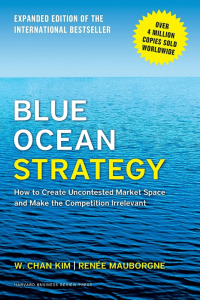In the ocean of business, where competition is fierce and red with rivalry, solopreneurs must find a way to sail into calmer, uncontested waters. "Blue Ocean Strategy" by W. Chan Kim and Renée Mauborgne isn't just a book; it's a new perspective. It's about eschewing the cutthroat competition of bloody red oceans and instead, charting your course into the serene, blue waters of untapped market space.

"Blue Ocean Strategy" challenges everything you thought you knew about strategic success and offers a systematic approach to making your competition irrelevant. Instead of battling competitors, the authors propose that you focus on creating "blue oceans" — new, uncontested market spaces ripe for innovation. The book pivots on several seminal concepts:
- Value Innovation: The cornerstone of blue ocean strategy, it's about breaking the value-cost trade-off, offering buyers a leap in value while simultaneously reducing your costs.
- The Strategy Canvas: A diagnostic tool and an action framework that helps you create a compelling blue ocean strategy.
- The Four Actions Framework: To break away from the competition, this tool allows you to reconstruct buyer value elements in crafting a new value curve.
- Eliminate-Reduce-Raise-Create Grid: This tool drives companies to focus on eliminating and reducing factors that the industry competes on, raising attributes well above the industry's standard, and creating elements the industry has never offered.
For solopreneurs, "Blue Ocean Strategy" is particularly impactful because it encourages the creation of new market spaces, a process that doesn't necessarily rely on massive resources but rather on innovation and strategic thinking. It's about creating value in fresh, uncontested areas — an approach that can be significantly more accessible for solopreneurs who may lack the resources to compete head-to-head with larger companies.
However, it's important to note that while "Blue Ocean Strategy" provides a groundbreaking framework for strategic market innovation, it doesn't delve into the practical nuances of internet marketing. Topics like SEO, social media marketing, content creation, and digital advertising are not the focus here. Instead, this book is about the bigger picture: the strategic positioning that allows such marketing efforts to thrive without the brutal competition seen in "red oceans."
In conclusion, "Blue Ocean Strategy: How to Create Uncontested Market Space and Make the Competition Irrelevant" is a seminal read for solopreneurs looking to make a distinctive mark in their industry. It's not just about competing for a larger share of the existing market; it's about creating a new market space that you dictate. Kim and Mauborgne's book doesn't teach you how to swim with the sharks; it teaches you how to navigate away from them, into a clear blue ocean where you chart the course.
ChatGPT Prompts:
"Blue Ocean Strategy: How to Create Uncontested Market Space and Make the Competition Irrelevant" by W. Chan Kim & Renée Mauborgne presents a transformative framework that encourages businesses to break out of saturated markets ("red oceans") and create new, uncontested market spaces ("blue oceans"). Here are some specific prompts for this book:
Understanding the Concepts:
- "What distinguishes a 'red ocean' strategy from a 'blue ocean' strategy, as outlined in the book?"
- "How does 'Blue Ocean Strategy' propose that companies can create new demand and shift industry boundaries?"
Application of Principles:
- "How might a company in a highly competitive industry apply 'Blue Ocean Strategy' principles to discover new market spaces?"
- "The book discusses the 'Four Actions Framework' (reduce, create, raise, and eliminate). How can a business use this framework to innovate its value proposition?"
Comparison with Other Strategies:
- "How does the 'Blue Ocean Strategy' compare and contrast with traditional competitive strategies like Porter's Five Forces?"
- "Can you compare the risk factors associated with pursuing a 'blue ocean' versus competing in a 'red ocean'?"
Exploring Specific Concepts:
- "What is the 'Value Innovation' concept in 'Blue Ocean Strategy,' and how does it challenge conventional marketing and strategic wisdom?"
- "How does 'Blue Ocean Strategy' suggest handling potential competitors in newly created market spaces?"
Critiques and Limitations:
- "What are some potential criticisms or limitations of the 'Blue Ocean Strategy'?"
- "Are there industries or types of businesses for which 'Blue Ocean Strategy' might not be applicable or particularly challenging to implement?"
Expansion Ideas:
- "How can the principles of 'Blue Ocean Strategy' be applied in the public sector or non-profit organizations?"
- "Can 'Blue Ocean Strategy' concepts be effectively utilized in personal career development or personal branding?"
Real-world Examples:
- "Can you identify a company or product that successfully executed a 'Blue Ocean Strategy'? What were the key factors in its success?"
- "What's an example of an attempt to create a 'blue ocean' that failed, and what lessons can be drawn from it?"
Reflection and Personal Application:
- "How has 'Blue Ocean Strategy' influenced your thinking about market competition and innovation?"
- "What elements of 'Blue Ocean Strategy' are you considering integrating into your current business model or future entrepreneurial endeavors?"
By harnessing the Power of Few-Shot and Multi-Shot Learning in Conversational AI, these prompts encourage readers to delve deeper into the strategic insights of "Blue Ocean Strategy," to critically evaluate its methodology, and to consider its practical application across various industries and professional scenarios.
